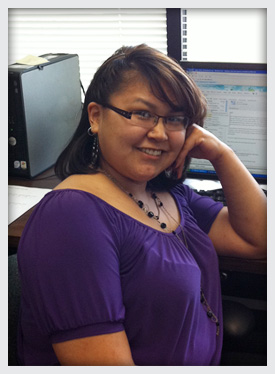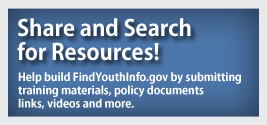Youth Voices: Angel

"There is always a way to make things better. Take the time to hear what youth have to say."
Angel — Peer Mentor Trainer
We spoke with Angel by phone on May 4, 2011.
Can you tell me a little bit about yourself?
Angel: I am 22 years old now and will be 23 in June. I grew up in the foster care system. I was in and out as far back as I can remember. My mom passed away when I was 13. Shortly after that I moved in with the family I am with now. They adopted me at the age of 16.
I graduated from high school in 2006 and then went on to college to pursue a Psychology and Art major. I got married last year – November 20th. Right now I work as a peer mentor trainer for Covenant House.
I love art – anything that has to do with art. Sculpting, painting, drawing, jewelry…anything. I learn really fast when it comes to art. Dancing… The main thing I like to do is draw and paint. I have a couple pieces of my art in a gallery. I have shared art in an art show. I give a lot of art away as gifts - birthday presents, Mother's Day, Father's Day, Christmas.
I have two biological brothers. In total I have 13 siblings up here and four down state. My parents are about to adopt one more. I have two sisters in Louisiana, one sister in California, and another brother that I don't remember where he is right now. I haven't met my older brother or my sister at all. Out of my siblings in Alaska, I'm the second oldest. I have one older brother; he is six months older than me and he always makes a big deal about it. He is my parents' biological son. After they adopted me and my oldest brother, they adopted so many more.
How would you describe your life transitioning to adulthood?
At times it was a struggle. Even now, just bills… I married into kids. You don't really know how hard it will be until you actually go through it. You don't know how hard. You don't actually feel it until you have gone through it. It's just a blessing and I'm so happy.
I moved out of my parents' house last April. Before that I was in the dorms for a semester. I still keep in touch with my parents and they help me. It's been fairly easy compared to other youth that I know who have been in foster care because I have a strong support system with my parents.
What are the ways in which your parents have been a good support for you?
Just being there. On top of that, I have my church family and they have been there just like my parents have. Any way they can be there, they are there. If I call my mom at three in the morning, she picks up the phone.
My mom got me to open up a lot when I first moved in with her. She taught me how to be a young lady. She taught me ethics and got me involved in church. My dad was always a strong supporter and they were very easy to talk to. They got me to open my eyes and see that the world isn't all just bad. They gave me a strength that I didn't have before. The strength that I had before was a protective strength so me and my brothers didn't get hurt. Hers was like a growing strength.
Going to my dances and art shows… I remember when my parents first took us out of state. I remember when we first got adopted. We went to Texas and Louisiana to visit her family. They introduced us as "my daughter" and "my son," which was exciting to me. My mom was excited because we were going to have clothes from Texas and Louisiana [which] the other kids in Alaska didn’t have. I emphasize my mom a lot because my dad works a lot, but when he is there I can go to him for things. He helps me plan surprises for my mom. Even if it gets really difficult he will make a way.
Bills. You don't realize when you're a kid or even a teenager how much your parents actually pay to take care of you. You obviously know about rent and electricity bills and cable bills and car notes and stuff like that. A lot of other things slip your mind like insurance, health insurance, gas, and vehicle repairs. It makes you really look back and really appreciate everything that my parents did because I see now that they really gave a lot in order for me and my siblings to be comfortable and happy.
Had my parents not adopted me and taken me under their wings, I believe I would have turned out very differently. At the age of 13, I was already really independent. I didn't want to listen to people in authority. I was taught from experience that they were there because they were being paid and would just be there for a little bit and didn't care and once they were able to not be in your life anymore, they won't be. I started getting it into my mind that I didn't need anybody and could handle life on my own. My parents showed me something completely different and showered me with love. They got me into church and God filled that hole.
My peers…If they don't have a really good support system or don't know where to look or where to find help, that's a huge challenge by itself because there is a feeling of being lost. You feel like there is no one there for you; you don't know what to do; you don't know where to step or how to take the next step. I strongly believe it is really important to have support. That's part of the reason why this new mentoring job that I have is great because the youth out there will have somebody who wants to be there and isn't paid to be there. They'll help them with simple things like a resume, or helping them learn to drive… normal things that everybody goes through.
What are some ways in which you were able to overcome some of the challenges you faced?
For me it was lots and lots of prayer, not only from my own mouth, but from my parents, church family, and scripture. I hold Philippians 4:13 dear to my heart, "I can do all things through Christ who strengthens me; oh Lord my strength and my redeemer." When things got rough I would repeat that.
I would also give myself pep talks. Some people feel silly doing it, but it really does help. You can talk to all the people you want to and get as much advice as you can, but if you don't motivate yourself to do things, you're not going to get anywhere because you're not going to want it for yourself. That's what I try to tell other youth: you have to want it for yourself. Nobody else is going to get it for you but you. Other people might help and be a factor, but they are not going to do it for you.
With my peers, it depends on the person. Everybody is different. If they don't have a strong support system, I'm sure they have other ways of motivating themselves. Some people have their siblings. For a long time it was my siblings because I had to take care of them before I got adopted. They motivated me to stay strong. Another motivation might be that they don't want to end up like those before them. Another motivation might be that they want to prove people wrong. That's also another factor of mine. People would tell me that I wasn't going to amount to anything and that I wasn't going to be good for anything else but laying on my back. I would take that and say, "Yeah right. Just watch. Wait and see." I guess I can't really speak for my peers. I can say what they might be thinking, but everyone is different. Everyone has their own thing that they do to keep on going.
Are there specific programs or organizations that are helpful?
Big Brothers Big Sisters
Boys and Girls Club
Activities at school – like sports (volleyball, etc.)
FFCA – Facing Foster Care in Alaska. Our mission is to improve the foster care system through sharing our experiences, supporting and educating youth and social services, and implementing positive change in society as a whole.
Covenant House has paired up with BBBS of Alaska and they created the CHAMPS program for youth 16-21. A lot of people don't like to touch that age group because they are difficult. They have gone through so much. Our goal is to match them with mentors so they can make it in life
How do you know they make a difference?
You can tell by the way they care and for the simple fact that they have been there for a long time. The CHAMPS program is a new program, but they are backed up by Covenant House and BBBS who have been there for years and years and years. You just feel like people care, which makes a big difference for children and youth. They are used to being thrown away, but when you get around people that care it's different and a bit scary.
Actions speak louder than words. Making the connection with another human being – a true, real connection. Not just "hey how're you doing, this is what we're working on right now and this is the goal, and we'll talk to you next week." Show that you care about their likes and dislikes, future goals, plans, interests. Show that you want to know the person.
The majority of the teachers I have come across in school actually care about their students. The students aren't just another child sitting in the classroom. All teachers aren't like that, but most teachers I have come across genuinely care and run the extra mile for their students. It's the same with the adults in these programs.
I had a dance teacher at West who was so dedicated to her students in helping them to achieve the greatest potential that she would cook spaghetti for her family for Thanksgiving instead of a huge turkey dinner, just to take the time for her students and have the dances be perfect.
Another teacher of mine was there since junior high all the way through high school. She was at my graduation. She sat right next to me. You could come to her for anything. She would come out of the classroom while she was teaching if she knew a student needed to talk.
Another teacher of mine–science teacher–he would bring in food for his students. He would actually cook in the classroom. He would take the time to know his students. He would stay after school or after classes to help students with their homework.
How could programs that serve youth in foster care system become more effective?
A lot of times it's really sticky when it comes to foster youth because they have to have permissions from their social workers. A lot of programs have to jump through hoops when it comes to foster youth and foster children just for them to be in the program. It would help if it was easier for youth to become a part of the program. Maybe if they could give the foster parents more leeway and give them more power to say "yes" or "no" to certain programs, then the sooner the youth or the child could get into a program that could benefit their life right then and in the future. Think about it: your parents are the ones who say yes or no to everything, but once the youth are in the system, the social worker says yes or no; not the foster parents.
I know a lot of these programs are always striving to do better and always have the children and the youth in mind and are trying to get the children involved in different things. I can't really think of anything.
What role did mentors play in your life?
I had a Big Sister when I was in the 6th grade all the way up to 8th grade. It helped to know I had somebody there who wasn't getting paid to be in my life and actually wanted to be in my life. Before my parents, I believe she was the only person who allowed me to escape from the craziness and the hectic parts of my life. My biological family had positive influences in my life, but they were still associated with alcohol and I didn't want to be a part of alcohol.
My mom was an alcoholic and she had a really bad boyfriend and I didn't like that. Her struggles burned not only herself, but also everyone around. Back then I was so mad at her. I couldn't understand why she chose these men and the drinks over her own children. But now that I look back at it I understand that she was hurting from her own past and bad relationships and low self esteem. I wish she had had the strength to move on and grow from that and all those bad things.
How does your experience inform how you interact with your mentees?
I'm not really a mentor. I am a trainer for mentors. I have a big role in helping foster youth, but I'm not actually a mentor.
I am in this group called Facing Foster Care in Alaska; I am the former Anchorage Regional Representative. I try to hold myself up and present myself in a way acceptable to Christ. Even without that I would want to present myself in the right way. I want to show youth that are going through what they are going through that they can make it, they are strong, and what they are going through is temporary. There is a bigger picture. You can look at the corner of the screen in the TV, but if the rest of the screen is covered up you won't know what else is going on in the movie and on the screen. I like to encourage people a lot and I like to give hugs. You never know how much of a difference you make in people's lives, so I try to stay as positive as possible and just give out a helping hand when I can.
I had pushed my culture away and tried to close that part of me away. All I saw from that part of me was alcoholism. I didn't see the beauty of the culture and how my culture teaches so much respect. I didn't want to have any part of it. My parents tried to get me interested. They knew that I loved beading, so they would get me beads and stuff. Even with getting involved in Native organizations or events in high school, they were enthusiastic about it and tried to get me to see my culture. They wanted me to see that alcoholism isn't all there is. They tell me that all cultures have bad things about them. My family is Black, but they would tell me to look at all the stereotypes about Black people, but that they didn't act like that. I started to see that I am Alaska Native and Hispanic and I'm proud of it and I don't drink alcohol. I didn't have kids at a young age. I married into kids, though. I am going to college. I am not going to end up on the streets and end up like a lot of people out there.
Did you have any art teachers or instructors who were mentors?
Not really. They could see that I had something special, so my art teachers were harder on me than on everyone else, but I was used to that. People are always a bit harder on me than on others, which can get stressful. In a way it helped mold me. They saw that I had something special and they pulled at it.
What is one essential way to make life better for young people you know?
Don't treat them like they are not human. They need to be heard, children and youth. A lot of times, people say, "You don't know what you're talking about. You're just a kid." That's not true. They have thoughts, they have feelings, they have opinions. Hear them out and make it a win-win situation. I'm not saying let your child or youth run around all hours of the night, but if they have a certain activity that's beneficial for them, let them do it. Even if you have a crazy schedule, make it work some kind of way. There is always a way to make things better.
Always take the time to hear what the youth or the child has to say. This is directed towards everyone in the child's life. I can remember countless times when I was in a TM – a meeting where all the people in the child's life come together to decide what is best for the child – and a lot of times they just talk about the child or youth like they are not there. They aren't able to get their point across, they aren't able to share their opinion or do anything. They just sit there and are talked about. Something I loved about my mom is that if I wasn't able to voice my opinion, I would tell my mom what I wanted to work on and she would get the point across. It's offensive and belittling to talk about the youth like they aren't there.
Can you explain what about the foster care system did or did not work for you?
Being moved around so much and separated from my siblings were the worst things. You're already taken out of your home. Even if you're in a bad environment, you still want to be with your parents. That and being separated from the only family you have left is really hard. It's traumatic. On top of that you get moved from home to home and taken out of your school. Any kind of stability that you did have is stripped from you.
I remember in one quarter in 6th grade I was moved around in seven different homes and seven different schools. I would stay up night after night just trying to catch up on work. My grades were very important to me. I wanted straight As. I would bust my butt to keep my grades up. It was hard, but I made it.
What would you say was good about the foster care system?
They took me out of a bad environment. I would say that the worst times that I had were not in foster care. They were when I was home. I learned a lot from different people. A few of my foster parents did have an effect on me. I learned a lot about different cultures.
They could have tried. They didn't. They didn't present me with any opportunities to stay connected with my culture. They didn't try. I was just moved from home to home and school to school.
Were peers a strong support system for you?
I would say yes. For a long time I considered my friends more of my family than my real family. The friends that I had would encourage me to do good in my classes. I tried to stay away from those who were a bad influence on me.

Subscribe to our newsletter for information on funding, events, publications, and more.

Tricia discusses what helped her survive despite tremendous odds. (video)
Marlon describes how a training program and afterschool photography class helped him grow. (video)
Chardae credits her mentor with helping her overcome life's challenges. (video)
Check out Bringing Learning to Life, a video describing the benefits of service-learning. (video)

Map My Community is a tool designed specifically to assist you in locating resources in your community to help you build and strengthen your youth program. Get ideas for new partnerships, identify gaps in your community, and learn about resources to avoid duplication of effort.















